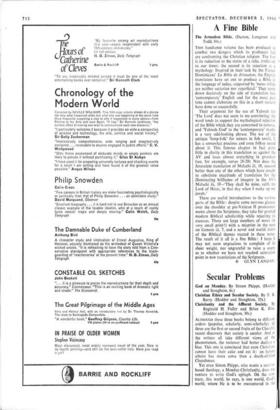A Fine Bible
THIS handsome volume has been produced to combat two dangers which its producers feel are confronting the Christian religion. The first is its reduction to the status of a relic, irrelevant to our times; the second is its rejection as a mythology. Inspired in their task by the French Dominicans' La Bible de Jerusalem, the English translators have set out to produce a Bible in the language of today, supported by 'notes which are neither sectarian nor superficial.' They conic down decisively on the side of translation into `contemporary' English and for the most part (one cannot elaborate on this in a short review) have done so successfully.
Their argument for the use of Yahweh for `The Lord' does not seem to me convincing; the word tends to support the mythological rejection of the Bible which they are concerned to remove, and 'Yahweh God' to the 'contemporary' reader is a very odd-looking phrase. The use of the antique lamp-folk' for miners in Job xxviii, 3, has a somewhat precious and even folksy sound about it. This famous chapter in fact gains little in clarity in this translation as against the AV and loses almost everything in grandeur (see, for example, verses 26-28). Nor does the Jerusalem translation of Malachi iii, 18, succeed better than any of the others which have sought to substitute exactitude of translation for the illuminating brilliance of imagery in the AV's Malachi iii, 18--`They shall be mine, saith the Lord of Hosts, in that day when I make up my jewels.'
There are useful introductions to the various parts of the Bible: despite some nervous glances over the shoulder at pre-Vatican II pronounce- ments about the Scriptures, they take for granted modern Biblical scholarship while rejecting its excesses. There are large numbers of notes (in very small print!) with a misprint in the note on Genesis iii, 7, and a novel and useful index of the Biblical themes treated in these notes. The result of it all is a fine Bible: I hope it may not seem ungracious to complain of its sheer weight, nor ungrateful to raise a query as to whether we have not reached saturation point in new translations of the Scriptures.
4. GLYN LANDAV:


































 Previous page
Previous page